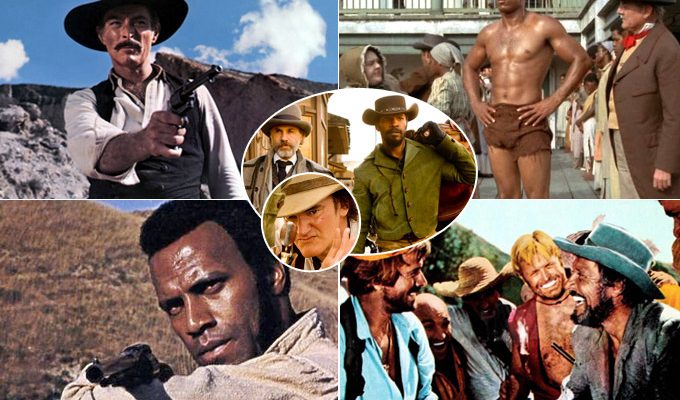5 ‘Slavesploitation’ Movies
 “Goodbye, Uncle Tom” (1971)
“Goodbye, Uncle Tom” (1971)
“Goodbye, Uncle Tom” is definitely the most singularly sleazy movie on this list. Co-directed and written by Gualtiero Jacopetti and Franco Prosperi (“Mondo Cane,” “Africa Addio”), “Goodbye, Uncle Tom” is a mockumentary that revels in dramatized scenes where naked slaves are abused and sexually mistreated. Ardent admirers of Federico Fellini’s films, Jacopetti and Prosperi aspired to a similarly carnivalesque atmosphere, best epitomized by musical composer Rizo Ortolani’s two main musical themes. Their film is much harder to watch than even “Satyricon” however, because it’s an ostensibly empowering film that also uses scenes where characters are graphically tortured, molested and humiliated for the sake of justifying a misguided cultural revolution. In the film’s concluding scenes, the diary of Nat Turner is read in voiceover narration as angry black men shoot and chop up white bourgies with guns and axes. This is after Busby Berkeley-style panoplies of naked slaves are shown in a ship’s brig while Jacopetti and Prosperi snicker via voiceover narration about how some slaves were force-fed yams and then made to live in their own diarrhea for days. The sarcastic and jeering pseudo-intellectual aspects of Jacopetti and Prosperi’s film are what makes “Goodbye, Uncle Tom” both so vile and so compelling. After a fashion, these filmmakers really did believe in the subversive power of their crass spectacle. So while Jacopetti and Prosperi’s invitations to incite a race riot are basically bullshit, the fact that they’re not trying to be benignly exploitative is also almost refreshing.
 “The Legend of Nigger Charley” (1972)
“The Legend of Nigger Charley” (1972)
The most controversial thing about “The Legend of Nigger Charley,” the first film in a trilogy, is its button-pushing title (its first sequel was also called, “The Soul of Nigger Charley”). But it’s also noteworthy as being a rare slavesploitation film starring an acknowledged blaxploitation star. Fred Williamson (“Black Caesar,” “Hell Up in Harlem”) stars as Charley, a slave that’s been promised his freedom when his master dies, but predictably doesn’t get it. Charley and two other slaves must then run away from their dead master’s vindictive son. Williamson’s lead performance distinguishes “The Legend of Nigger Charley” from other slavesploitation films. He doesn’t have much to work with, and he certainly doesn’t have much range, either. But he really makes “The Legend of Nigger Charley” work when it most needs to, as in scenes where Charley wonders aloud if there is in fact a fundamental difference in character between black and white men. If the film’s conclusion, in which Charley accepts that there is in fact an empowering difference, is at all effective, it’s because of Williamson’s charisma.
 “Black Snake” (1973)
“Black Snake” (1973)
As with many exploitation films, “Black Snake” is mostly memorable for its stand-out scenes of explicit sexuality and cruel violence. Let it never be said that director Russ Meyer didn’t know how to pander to his audience. For example, the film is more focused on Lady Susan Walker (Anouska Hempel), the film’s cruel, whip-cracking white slave owner, than on any singular slave hero. Meyer’s film also anticipates and goes further in exploring some of the pseudo-moral questions in “Mandingo” by prominently featuring Bernard Boston as Captain Raymond Daladier, a cruel, French-speaking black taskmaster from Jamaica. Like many other grand guignol-inspired slavesploitation films, Meyer’s movie assumes that any character that has a modicum of power but fails to sympathize with slaves deserves whatever punishment they get. The slave uprising that concludes the film is perfunctory since the film is only ostensibly empowering. But the film’s main selling points, like seeing Hempel’s ample buttocks massaged in close-up, are certainly memorable, perhaps because “Black Snake” was Meyer’s first independent film after his brief stint making studio-produced films “The Seven Minutes” and “Beyond the Valley of the Dolls.” “Black Snake” is a slight movie, but it is a superior expression of the kind of ‘what-if’ scenario that Tarantino plays around with in “Django Unchained,” a comedy that effectively argues for the symbolic importance of historical role-playing in exploitation cinema.

